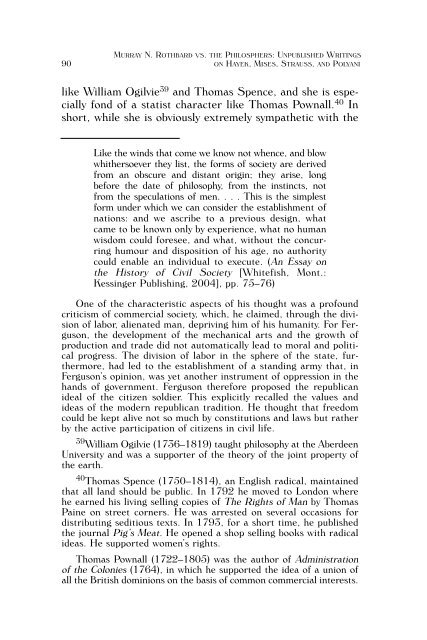Murray N. Rothbard vs. the Philosophers - Ludwig von Mises Institute
Murray N. Rothbard vs. the Philosophers - Ludwig von Mises Institute
Murray N. Rothbard vs. the Philosophers - Ludwig von Mises Institute
You also want an ePaper? Increase the reach of your titles
YUMPU automatically turns print PDFs into web optimized ePapers that Google loves.
MURRAY N. ROTHBARD VS. THE PHILOSPHERS: UNPUBLISHED WRITINGS<br />
90 ON HAYEK, MISES, STRAUSS, AND POLYANI<br />
like William Ogilvie 39 and Thomas Spence, and she is especially<br />
fond of a statist character like Thomas Pownall. 40 In<br />
short, while she is obviously extremely sympa<strong>the</strong>tic with <strong>the</strong><br />
Like <strong>the</strong> winds that come we know not whence, and blow<br />
whi<strong>the</strong>rsoever <strong>the</strong>y list, <strong>the</strong> forms of society are derived<br />
from an obscure and distant origin; <strong>the</strong>y arise, long<br />
before <strong>the</strong> date of philosophy, from <strong>the</strong> instincts, not<br />
from <strong>the</strong> speculations of men. . . . This is <strong>the</strong> simplest<br />
form under which we can consider <strong>the</strong> establishment of<br />
nations: and we ascribe to a previous design, what<br />
came to be known only by experience, what no human<br />
wisdom could foresee, and what, without <strong>the</strong> concurring<br />
humour and disposition of his age, no authority<br />
could enable an individual to execute. (An Essay on<br />
<strong>the</strong> History of Civil Society [Whitefish, Mont.:<br />
Kessinger Publishing, 2004], pp. 75–76)<br />
One of <strong>the</strong> characteristic aspects of his thought was a profound<br />
criticism of commercial society, which, he claimed, through <strong>the</strong> division<br />
of labor, alienated man, depriving him of his humanity. For Ferguson,<br />
<strong>the</strong> development of <strong>the</strong> mechanical arts and <strong>the</strong> growth of<br />
production and trade did not automatically lead to moral and political<br />
progress. The division of labor in <strong>the</strong> sphere of <strong>the</strong> state, fur<strong>the</strong>rmore,<br />
had led to <strong>the</strong> establishment of a standing army that, in<br />
Ferguson’s opinion, was yet ano<strong>the</strong>r instrument of oppression in <strong>the</strong><br />
hands of government. Ferguson <strong>the</strong>refore proposed <strong>the</strong> republican<br />
ideal of <strong>the</strong> citizen soldier. This explicitly recalled <strong>the</strong> values and<br />
ideas of <strong>the</strong> modern republican tradition. He thought that freedom<br />
could be kept alive not so much by constitutions and laws but ra<strong>the</strong>r<br />
by <strong>the</strong> active participation of citizens in civil life.<br />
39William Ogilvie (1736–1819) taught philosophy at <strong>the</strong> Aberdeen<br />
University and was a supporter of <strong>the</strong> <strong>the</strong>ory of <strong>the</strong> joint property of<br />
<strong>the</strong> earth.<br />
40Thomas Spence (1750–1814), an English radical, maintained<br />
that all land should be public. In 1792 he moved to London where<br />
he earned his living selling copies of The Rights of Man by Thomas<br />
Paine on street corners. He was arrested on several occasions for<br />
distributing seditious texts. In 1793, for a short time, he published<br />
<strong>the</strong> journal Pig’s Meat. He opened a shop selling books with radical<br />
ideas. He supported women’s rights.<br />
Thomas Pownall (1722–1805) was <strong>the</strong> author of Administration<br />
of <strong>the</strong> Colonies (1764), in which he supported <strong>the</strong> idea of a union of<br />
all <strong>the</strong> British dominions on <strong>the</strong> basis of common commercial interests.


